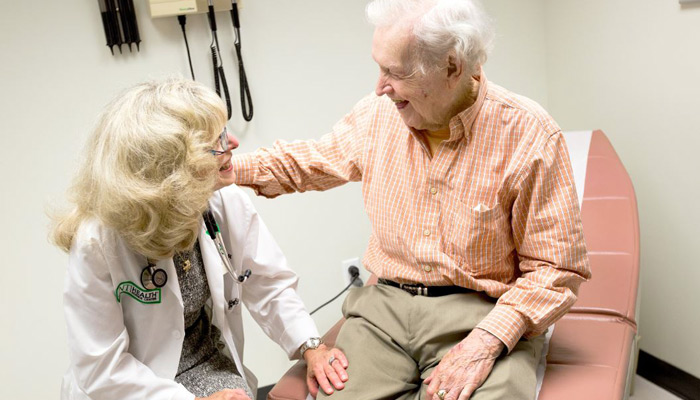Fort Worth team to focus on improving health care for older residents

UNT Health Science Center will team up with JPS Health Network, Texas Christian University and the United Way’s Area Agency on Aging of Tarrant County to transform geriatric care in North Texas by improving medical training and health-care delivery for the region’s rapidly growing population of older residents.
The unique collaboration is among initiatives in 29 states – and the only one in Texas – selected for $35.7 million in funding from the Department of Health and Human Services to improve health care for older adults.
“It’s an honor to be awarded this grant, and now the transformational work begins,” said Janice Knebl, DO, Chief of Geriatrics and holder of the Dallas Southwest Osteopathic Physicians Endowed Chair in Clinical Geriatrics. “We’re going to use the resources and expertise of our academic institutions, county hospital, the aging network providers and the city to improve the quality of care for older adults in Fort Worth and its surrounding communities.”
The Tarrant County project – called WE HAIL, or Workforce Enhancement Healthy Aging and Independent Living – received $850,000 in first-year funding. Its goals include increasing the number of health care providers trained to meet the needs of older adults and integrating geriatric training into academic programs for doctors, nurses, pharmacists, physical therapists and other health care professionals.
In addition, geriatric training will be integrated into medical education for residents, and a Geriatrics Certificate Program will be created within the Family Medicine Residency at JPS.
“Human physiology changes across the lifespan,” said Elizabeth Carter, MD, Chair of Family Medicine at JPS. “It’s well recognized that children benefit from pediatric care. Likewise, older adults benefit from health care that recognizes their unique physiology. Unfortunately, there is a significant and growing shortage of doctors and nurses trained to care for older adults.”
Mirroring national demographic trends, Tarrant County’s population of adults 65 and older is expected to both triple and make up nearly 20 percent of the population by 2050. The training of medical practitioners has not kept pace. Less than 3 percent of all medical students take even a single course in geriatrics, according to the Gerontological Society of America.
“This is a wonderful opportunity to teach health care specialists to work together interprofessionally as a team in the care of older adults,” said Diane Hawley, PhD, Associate Professor of Professional Practice and Coordinator of the Nurse Educator Program at TCU’s Harris College of Nursing & Health Sciences. “We anticipate remarkable outcomes, not only for older people, but also for the caregivers of those individuals.”
UNTHSC has taken a leading role in geriatrics education. A 2009 Donald W. Reynolds Foundation Grant created the Reynolds Geriatrics Education and Training in Texas program that has integrated geriatrics throughout all four years of undergraduate medical education, culminating in a mandatory core fourth-year geriatrics clerkship.
Last year, the Reynolds Foundation Next Steps program funded a collaboration between UNTHSC and TCU to create the Reynolds Interprofessional Geriatrics Education and Training in Texas program that educates medical, physician assistant, pharmacy, physical therapy, nursing, social work and dietetics students in a team approach to care.
“We are extremely excited to be working in close partnership with UNTHSC, TCU and JPS to improve and expand services to under-served older adults and their caregivers in Tarrant County,” said Don Smith, Director of United Way’s Area Agency on Aging of Tarrant County.






Social media